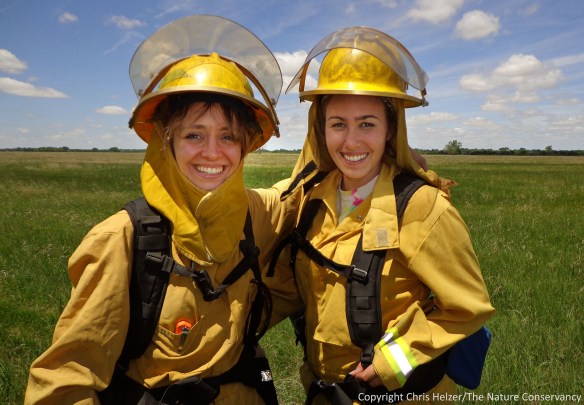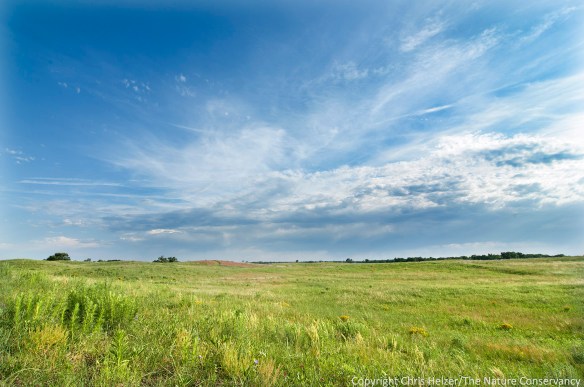Back in February, I wrote about our new Hubbard Fellowship program. Anne Stine and Eliza Perry joined us in early June as our first two Fellows, and have been enthusiastically soaking in the prairie life ever since. Anne comes from northern Virginia, but just graduated with a Master’s of Science degree from Duke University. Eliza is from Maine and completed a Bachelor’s degree from Bates College.
We are in the process of setting up a blog for the Hubbard Fellowship, through which Eliza and Anne will be able to share their experiences over the next year – and those experiences are already coming fast and furious. During their first three weeks, they have controlled invasive thistles with spades and herbicide, killed trees with PVC herbicide wands ( “kill sticks”) and chainsaws, harvested seeds, learned to drive an ATV and tractor, attended conference with staff of The Nature Conservancy from twenty-three states, got a guided tour of lands managed by the Prairie Plains Resource Institute, wrangled a cow wrapped in fencing wire, herded cattle, repaired and erected electric fences, observed a prescribed burn, and have been learning the basics of grassland ecology and management. Since the Fellowship blog isn’t up and running yet, I asked Anne and Eliza to write down some brief thoughts about their experiences so far and am sharing them here:

Anne Stine (left) and Eliza Perry (right), dressed up for a prescribed fire – one of many new experiences during their first three weeks on the job.
Eliza:
The sky in Nebraska is without a doubt “bigger” than it is in Maine, where I hail from. As much as I love watching the sun rise over the ocean, I have experienced few sunsets that rival those here in the prairie, which spread melting color 360 degrees around the sky. Every day here has been another new and blissfully challenging adventure. I have entered a whole new landscape, ecosystem, and culture (and time zone!). As a student of Environmental Studies with a focus on environmental ethics and philosophy, I am always curious about the differing interests of those living in both the human and non-human communities I get to work with in the coming months. The “Midwestern hospitality” mindset that I heard about before my arrival certainly extends into Nebraska, even if there is controversy over whether it is a Midwestern state. Folks here really know how to make a newcomer feel welcome and at home, which is especially appreciated on my end.
I had always assumed there to be a well-established, precise order to the world of professional conservation, and while the staff here have extensive experience with grasslands, it is clear that their jobs present just as much of a learning experience as mine. At a Nature Conservancy conference not long after we arrived, I was privileged to listen in on a fascinating conversation between Chris and two other Great Plains ecologists about grazing strategies. Grazing is a staple management tool for grassland conservation. All three are veteran scientists, and they exchanged an amazing amount of insight during a back and forth discussion of the advantages and disadvantages of permitting cattle to graze in one area for an extended period of time versus quickly moving them along a specified route. I would have thought a resolution had long been set in stone, but the more I learn, the more I understand how complex and dynamic this ecosystem is, which is an awareness I was lectured on but rarely felt or experienced during my undergraduate coursework. At this point, I am not yet grazing or grassland savvy enough to offer my perspective on the matter, but the conversation itself demonstrated some general trends within the event, namely that TNC folks love their jobs and are eager to engage with topics of their own and others’ expertise. I have not encountered such enthusiasm anywhere that I have worked in the past and it was extremely energizing to see.
Yet as exciting as everything is and continues to be, inexperience is a strange—though exhilarating—feeling, and I am looking forward to the day when I can glance down and identify more than ten species at my feet, or fix an ATV or a fence without calling for help every step of the way (we work with some divinely patient people). That day is close, that much I know!

The Nature Conservancy’s wide open prairies along the Platte River are very different from the landscapes where Eliza and Anne grew up. They seem to be adapting just fine…
Anne:
I drove cross country three times before I stopped in the prairie. I zipped along the Gulf Coast to the Four Corners and California, only noting the silted up Americana along Rt. 287 from Dallas to Amarillo and the steppes and mesas of Northern New Mexico in the southern plains. Other than that, I was target oriented. Eyes glazed, listening to podcasts and classic country on the radio from DC to Arizona.
When I first arrived in Nebraska to interview for the Hubbard Fellowship it was April, and the great Sandhill Crane migration was underway. I saw long-legged, long-necked grey birds picking through the brown cornfields, I could hear them croaking to each other in flight overhead, and I could see what I thought was their grey feathers in coyote scat along mown trails in the brown prairie. I didn’t know what to make of this early spring grassland, but I was excited about the Fellowship and I decided to gamble on the unknown.
Returning to the prairie in June meant landing in a wide green meadow of wildflowers and sloughs. During my run along the Platte on my first morning, I saw two deer, three rabbits and a turkey. Nebraska seemed like a rich place for me to live out my Huck Finn adventures—I’d go fishing in the creek (done), hunting in the fall (enrolled in Hunter’s Education), and canoeing in the Platte (impossible, but more on that later). I’d learn every grass and flower, fix fences and help with restoration. The early summer greenness urged me to fully immerse myself in prairie life.
I am eager to learn more about this new world in which I am privileged to reside for a full turn of the seasons. This is a subtle landscape that one must inhabit to know, about which Willa Cather famously wrote:
“There was nothing but land; not a country at all, but the material out of which countries are made.”
― Willa Cather, My Ántonia

Well, well, well . . . the ladies are wordsmiths of a caliber challenging even YOU, Brother Helzer. ;-{)>
I know, right? Took me 13 years to get TNC to give me a blog, and they’re going to get theirs within a few months of starting their job!
It must be a joy to have two enthusiastic young ladies working to preserve the Platt River prairies. Their “thoughts and experiences” remind me of when I first stumbled on the book “The Prairie Keepers: Secrets of the Zumwalt” by Marcy Houle. I found a copy in a forgotten section of the biology library at my University. It is amazing how reading a book can make you see your world in a new way. This new view can lead to a transcendental moment just as powerful as seeing a Giant Sequoia or visiting Yosemite. When I left the Midwest, people commonly told me I was from a fly-over state. It is amazing how differently I viewed my home. The word that comes to mind is sacred. I hope Eliza and Anne record their feelings and experiences in a journal. I hope future interested young minds might discover the prairie through their writing. Learn to love it. And just maybe might decide to help preserve it.
James McGee
Your Fellows are inspirational, Chris. Your big sky and prairie have already changed their lives forever.
Love their enthusiasm!! And they have a great teacher!
Here’s another Willa Cather quote they may relate to:
“Anyone can love the mountains, but it takes a soul to love the prairie.”
That is a fantastic quote! But I couldn’t find any sources online that mentioned Cather wrote it – mostly found it attributed to “Old Nebraska Sodbuster Saying” (ironic) as well as “Author unknown”.
Fabulous quote, Lynn!
But what I really wanted to say is how well this blog post reflects the joy I have in my job, in passing along love and lore of the prairie to younger people!
FYI…
I got the Cather quote from an interpretive kiosk during a recent camping trip to Toadstool Park in the Oglala National Grassland. Didn’t check the veracity. Figured the Feds knew what they were doing . Right?
Pingback: Watching the Sandhills Bounce Back at the Niobrara Valley Preserve | The Prairie Ecologist
Pingback: Hubbard Fellowship Blog – Weed Whacking with Konstantin | The Prairie Ecologist
Pingback: Hubbard Fellowship Blog – Photos by Eliza | The Prairie Ecologist
Pingback: It’s Bee Week! | The Prairie Ecologist
Pingback: Why There Is No Cookbook for Restoring and Managing Prairies | The Prairie Ecologist
Pingback: Hubbard Fellowship Blog – A Few of Anne’s Favorite Bees | The Prairie Ecologist
Pingback: Hubbard Fellowship Blog – Why is Prairie Conservation Important? | The Prairie Ecologist
Pingback: Hubbard Fellowship Blog – Anne’s Trip to Colorado | The Prairie Ecologist
Pingback: Hubbard Fellowship Blog – Seed Harvest Musings | The Prairie Ecologist
Pingback: Goofy Bees | The Prairie Ecologist
Pingback: Isn’t it a little late to be nesting? | The Prairie Ecologist
Pingback: Hubbard Fellowship Blog – Lobelias and Pollinators | The Prairie Ecologist
Pingback: Hubbard Fellowship Blog – Last Day for the Cattle | The Prairie Ecologist
Pingback: Hubbard Fellowship Blog – Hummingbird Moths | The Prairie Ecologist
Pingback: Hubbard Fellowship Blog – Conferences | The Prairie Ecologist
Pingback: Hubbard Fellowship Blog – Mystery Eggs | The Prairie Ecologist
Pingback: Hubbard Fellowship Blog: Roundup Time | The Prairie Ecologist
Pingback: Hubbard Fellowship Blog – Planning a Prairie Garden | The Prairie Ecologist
Pingback: Hubbard Fellowship Blog – December Update from Eliza | The Prairie Ecologist